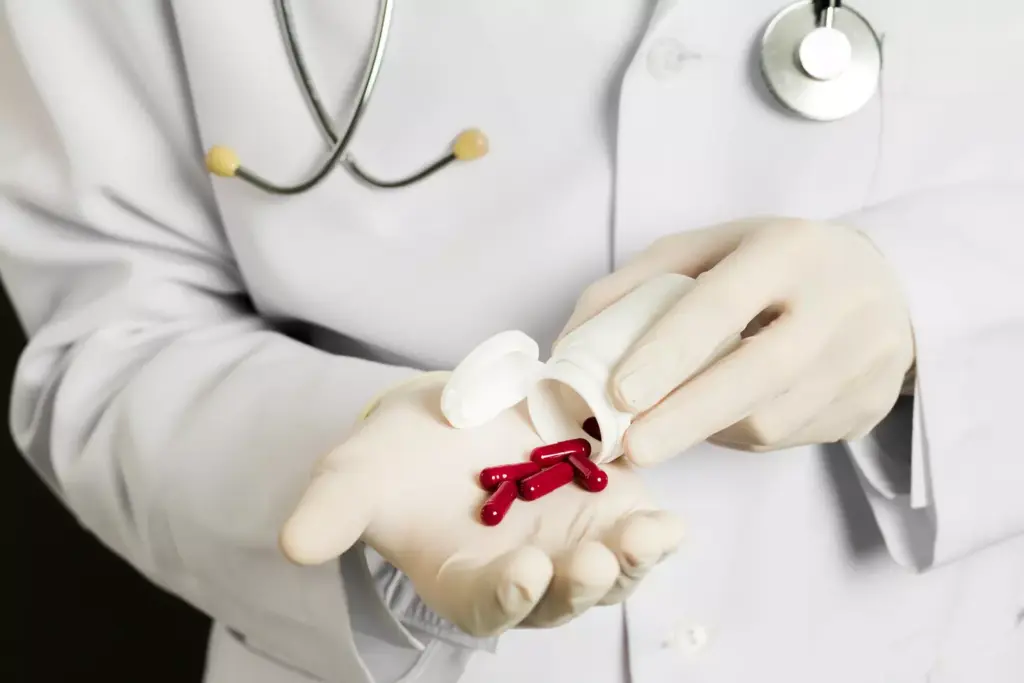
Advances in breast cancer treatment have led to new effective oral chemotherapy options. We see a big change from old intravenous chemotherapy to easier pill forms. Up to 77% of breast cancer patients like oral chemotherapy more because it’s easier and they don’t have to go to the hospital as much.
Oral chemotherapy drugs help fight breast cancer cells at different stages, including when it has spread and in early stages. By taking chemotherapy pills, patients can handle their treatment better. This makes their life quality better.
Key Takeaways
- Oral chemotherapy offers a convenient alternative to IV treatments for breast cancer.
- Up to 77% of breast cancer patients prefer oral chemotherapy due to reduced hospital visits.
- Oral chemotherapy drugs target and destroy breast cancer cells at various stages.
- Pill forms of chemotherapy improve patient quality of life.
- Liv Hospital provides world-class healthcare with complete support for international patients.
The Evolution of Breast Cancer Treatment: From IV to Oral Options

Oral chemotherapy for breast cancer has started a new chapter in treatment. It gives patients easier options. This change from IV to oral drugs is thanks to better drug development and the need for treatments that are easier for patients.
Historical Context of Chemotherapy Administration
Chemotherapy has been key in fighting breast cancer for a long time. At first, it was given through IVs. This method was effective but often meant long hospital stays and tough side effects. Over time, we’ve moved towards more targeted and less invasive ways to fight cancer.
The Paradigm Shift to Pill-Based Treatments
The arrival of breast cancer chemotherapy pills has changed how we treat the disease. Oral chemotherapy lets patients take their treatment at home. This cuts down on hospital visits and can make life easier for them. Thanks to better research, we now have chemotherapy pills for breast cancer that work as well as IV treatments.
| Aspect | IV Chemotherapy | Oral Chemotherapy |
|---|---|---|
| Administration Method | Intravenous infusion | Oral pills |
| Frequency of Treatment | Regular hospital visits | Daily oral administration at home |
| Patient Convenience | Less convenient due to hospital visits | More convenient, manageable at home |
| Side Effects Management | Often managed in a clinical setting | Requires patient self-management |
Impact on Patient Care and Healthcare Systems
The move to oral chemotherapy has changed patient care and healthcare systems a lot. For patients, it means more control over their treatment and possibly fewer side effects. For healthcare, it can lead to lower costs because of fewer hospital visits. But, it also means we need to teach patients more about their treatment and support them well.
The growth of breast cancer treatment towards oral chemotherapy is a big step forward in cancer care. As we keep improving these treatments, our goal is to make patients’ lives better and their treatment outcomes better too.
Understanding Oral Chemotherapy Drugs for Breast Cancer

Oral chemotherapy drugs have changed how we treat breast cancer. They offer a convenient option instead of IV chemotherapy. These drugs target cancer cells well and reduce the need for hospital visits.
How Oral Chemotherapy Works in the Body
Oral chemotherapy drugs target fast-growing cancer cells. They stop these cells from growing and multiplying, causing them to die. This helps control breast cancer’s spread.
We have different oral chemotherapy drugs, each working in its own way. Some damage cancer cells’ DNA, while others mess with their cell cycle. Knowing how these drugs work is key to treating breast cancer effectively.
Bioavailability and Absorption Considerations
The success of oral chemotherapy drugs depends on how well they are absorbed. Bioavailability is how much of the drug gets into the bloodstream. Food, other medicines, and individual factors can change this.
- Food can affect how well oral chemotherapy drugs are absorbed.
- Some drugs need to be taken on an empty stomach, while others with food to reduce side effects.
- Knowing these details is important for making oral chemotherapy work best.
The Science Behind Pill Formulations
Creating oral chemotherapy drugs into pills is a complex process. These pills are made to keep the drug stable and effective. The process includes choosing ingredients that help the drug absorb better and stay stable.
“The development of oral chemotherapy drugs has transformed the way we treat breast cancer, giving patients more options and better quality of life.”
We keep improving how we make pill formulations. This helps deliver oral chemotherapy drugs better and improves patient results.
Capecitabine (Xeloda): The Most Common Oral Chemotherapy Option
Capecitabine (Xeloda) is a big step forward in treating breast cancer. It comes in a pill form and is taken twice a day. We’ll look at how it works, its uses, and how well it fights breast cancer.
Pill Form and Dosing Schedule
Capecitabine is a tablet taken twice daily. The dose is based on the patient’s body size. The usual dose is 1250 mg/m² twice daily for 2 weeks, then a week off. This cycle is repeated as needed.
Primary Uses in Metastatic and Early-Stage Breast Cancer
Capecitabine is used for both metastatic and early-stage breast cancer. It’s often given alone or with other treatments for metastatic cancer. For early-stage cancer, it’s used when other treatments fail. Xeloda has been shown to help patients.
Effectiveness Data and Clinical Outcomes
Studies show capecitabine is effective against breast cancer. It can help patients live longer and keep the cancer from growing. It’s also easier on patients because it’s taken orally, not through an IV.
Managing Hand-Foot Syndrome and Other Side Effects
Hand-foot syndrome (HFS) is a common side effect. It causes redness, swelling, and peeling on the palms and soles. To manage HFS, patients need to moisturize, avoid hot water, and wear comfy shoes. Other side effects like diarrhea and fatigue are also watched and treated.
Cyclophosphamide (Cytoxan): Versatile Oral Treatment Across Cancer Stages
Cyclophosphamide, also known as Cytoxan, is a key oral chemotherapy for breast cancer at all stages. It has been a mainstay in cancer treatment for many years. It offers a valuable option for both patients and doctors.
Tablet Formulation and Administration Guidelines
Cyclophosphamide comes in tablet form, making it easy to take. The dosage and when to take it can change based on the treatment plan and the patient. It’s important to stick to the dosing schedule to get the best results and avoid side effects. Patients must remember to take the medication as directed and not skip doses.
Applications in Different Breast Cancer Subtypes
Cyclophosphamide is used in many breast cancer types, including those with and without hormone receptors. Its flexibility allows it to fit into various treatment plans. It targets fast-growing cancer cells, helping with both early and advanced breast cancer.
Combination Approaches with Other Therapies
Cyclophosphamide works well with other cancer treatments. It can be combined with chemotherapy, hormonal, or targeted therapies. For more on these combinations, check out this resource on cancer treatment.
Monitoring Blood Counts and Hydration Needs
While taking cyclophosphamide, it’s vital to keep an eye on blood counts. Regular blood tests are needed to check for bone marrow suppression. Also, staying hydrated is key to avoid side effects like hemorrhagic cystitis. Patients should drink lots of water and follow their doctor’s hydration advice.
Methotrexate: Low-Dose Oral Option for Specific Cases
Methotrexate is a drug used for some breast cancer cases. It’s given in low doses. We’ll look at how it’s used and managed in breast cancer treatment.
Tablet Strengths and Dosing Protocols
Methotrexate comes in different strengths, from 2.5mg to 10mg. The dose for breast cancer treatment varies. It depends on the treatment plan and the patient’s health.
For example, a common dose is 2.5mg to 5mg twice a week. But, the exact dose and how often it’s taken depends on the patient’s needs and treatment goals.
Role in Maintenance and Metronomic Therapy
Methotrexate is important in keeping some breast cancer patients in control. It’s used in low doses to reduce side effects. Metronomic therapy, which uses low doses often, can stop tumors from growing and boost the immune system.
In breast cancer, methotrexate in metronomic therapy is promising. It’s good for patients who can’t handle high doses or need long-term treatment.
Folate Supplementation Requirements
At higher doses, methotrexate often needs folate to prevent side effects. Folate lowers the risk of mouth sores and low blood cells. The folate dose varies, from 1mg to 5mg a day, based on the methotrexate dose and patient health.
It’s important for patients to follow their folate supplement plan. This helps avoid side effects while keeping the benefits of methotrexate therapy.
Long-term Management Considerations
Managing methotrexate long-term means checking blood counts, liver, and kidney function often. Patients should know about possible side effects like tiredness, nausea, and infections. Regular check-ups with the doctor are key to adjusting the treatment as needed.
| Monitoring Parameter | Frequency | Purpose |
|---|---|---|
| Complete Blood Count (CBC) | Every 1-3 months | To detect cytopenias and adjust dosing |
| Liver Function Tests (LFTs) | Every 3-6 months | To monitor for hepatotoxicity |
| Renal Function Tests | Every 3-6 months | To assess kidney function and adjust dosing if necessary |
By managing methotrexate therapy well and checking patients often, doctors can make this oral chemotherapy option work best for breast cancer patients.
Four Additional Key Oral Chemotherapy Drugs
Newer medications have come to the forefront in treating breast cancer. These drugs are key in targeted therapy and offer more options for patients.
Palbociclib (Ibrance): CDK4/6 Inhibitor in Pill Form
Palbociclib, known as Ibrance, is a CDK4/6 inhibitor. It has shown great promise in treating certain breast cancers. Administered orally, it blocks enzymes that help cancer cells grow. Studies have shown it improves survival when paired with hormone therapy.
The arrival of palbociclib has changed how we treat HR-positive, HER2-negative advanced breast cancer. Its oral form is easier for patients to take, making treatment more manageable.
Everolimus (Afinitor): mTOR Inhibitor Tablets
Everolimus, or Afinitor, is an mTOR inhibitor for advanced breast cancer. It slows down cancer cell growth by blocking the mTOR pathway. It’s mainly used for hormone receptor-positive, HER2-negative breast cancer in postmenopausal women.
Everolimus is easy to take, but it needs careful monitoring for side effects like pneumonitis and high blood sugar.
Lapatinib (Tykerb): Oral Tyrosine Kinase Inhibitor
Lapatinib, or Tykerb, is a tyrosine kinase inhibitor for HER2-positive breast cancer. It blocks the HER2 protein, slowing cancer cell growth. It’s often used with other treatments to boost its effect.
Lapatinib’s oral form gives patients a flexible treatment option. But, it needs careful dosing to avoid side effects like diarrhea and liver issues.
Abemaciclib (Verzenio): Newest Oral Option
Abemaciclib, or Verzenio, is a new CDK4/6 inhibitor for breast cancer. It’s effective in HR-positive, HER2-negative advanced or metastatic breast cancer, alone or with hormone therapy.
Administered orally twice daily, abemaciclib offers a new treatment path. Its approval is a big step forward in managing advanced breast cancer, giving patients more choices and potentially better outcomes.
Benefits and Challenges: Oral vs. IV Chemotherapy
Oral chemotherapy is becoming a top choice for many breast cancer patients. It challenges the old IV chemotherapy way. We need to look at the good and bad sides of these treatments. This includes how patients feel, how well the treatment works, and its effect on healthcare.
Patient Preference Statistics
About 77% of patients like oral chemotherapy better than IV. They like it because it’s easy and they don’t have to go to the hospital as much. Oral chemotherapy lets patients take their treatment at home.
Choosing oral chemotherapy can make patients happier and more likely to stick with their treatment. It avoids the hassle of IVs, like needle fears and possible problems like leaks.
Convenience and Reduced Hospital Visits
Oral chemotherapy means fewer trips to the hospital. This makes patients happier and saves money on hospital stays and clinic visits. It lets patients keep up with their daily life better, improving their quality of life.
Key Benefits of Oral Chemotherapy:
- Reduced need for hospital visits
- Improved patient satisfaction
- Lower healthcare costs
- Enhanced flexibility and comfort
Financial Considerations and Insurance Coverage
Oral chemotherapy has its downsides, like high costs. Insurance coverage can vary a lot. We need to think about the money side of oral chemotherapy. We help patients deal with insurance and any extra costs they might face.
| Aspect | Oral Chemotherapy | IV Chemotherapy |
|---|---|---|
| Administration | At home | In hospital/clinic |
| Patient Preference | 77% prefer oral | Less preferred |
| Cost | Potentially high | Varies with insurance |
The Critical Importance of Medication Adherence
It’s key for oral chemotherapy to work well that patients take their medicine as told. Unlike IVs, where doctors watch, oral chemotherapy is up to the patient. We stress how important it is to stick to the treatment plan. We help patients find ways to remember to take their medicine.
Strategies for Improving Adherence:
- Clear patient education on dosage and timing
- Use of pill boxes or reminder apps
- Regular follow-up appointments
- Support from family and caregivers
Understanding the good and bad of oral vs. IV chemotherapy helps us support our patients better. As we keep improving how we treat breast cancer, oral chemotherapy will be more and more important.
Oral Chemotherapy Across Different Breast Cancer Stages
Oral chemotherapy is key in fighting breast cancer, from the early stages to when it spreads. We’ll look at how these treatments work at different stages. We’ll also talk about their benefits and the specific plans for each stage.
Early-Stage (Stage 1-2) Applications and Protocols
In early breast cancer, oral chemotherapy helps lower the chance of it coming back after surgery. Capecitabine (Xeloda) is a common drug used here. Patients take it twice a day for two weeks, then a week off. This cycle goes on for months, as the doctor advises.
Using oral chemotherapy early on can be less harsh. It lets patients treat themselves at home. This makes life easier during a tough time.
Metastatic (Stage 4) Treatment Approaches
For breast cancer that has spread, oral chemotherapy is a flexible option. It’s often paired with other treatments. Palbociclib (Ibrance), a CDK4/6 inhibitor, works well with hormone therapy. Patients take Palbociclib once a day for 21 days, then a week off, with hormone therapy all the time.
The aim of oral chemotherapy in advanced disease is to slow cancer growth. It also helps manage symptoms and improve life expectancy. The right oral chemotherapy depends on many factors, like past treatments and the cancer’s type.
Maintenance Therapy After Initial Treatment
After first treatment, oral chemotherapy can help keep cancer under control. It’s used more for those who responded well to initial treatment. Capecitabine is often chosen for this because it works well and has fewer side effects.
How long maintenance therapy lasts varies. It depends on the patient and the treatment plan. Regular check-ups are key to see if it’s needed and to handle any side effects.
When Oral Options Replace Failed IV Treatments
If IV chemotherapy stops working or causes too many side effects, oral chemotherapy can be a good alternative. Lapatinib (Tykerb), a tyrosine kinase inhibitor, is used when IV treatments fail, mainly in HER2-positive cancer.
Switching to oral chemotherapy needs careful thought. It’s based on the patient’s past treatments, current health, and cancer status. The goal is to find an oral treatment that controls the disease and improves life quality.
Conclusion: The Future Landscape of Oral Breast Cancer Treatments
Looking ahead, oral chemotherapy will remain key in breast cancer treatment. New drugs and better treatments are on the horizon. This is thanks to ongoing research and development.
Future treatments will likely be more personalized. They will use the latest science to match therapies to each patient. Oral treatments will become more common, making treatment easier and less invasive.
Improvements in oral chemotherapy drugs will focus on better results and fewer side effects. This will make treatments more effective and easier to handle. Researchers are working hard to find new ways to fight breast cancer.
We are dedicated to top-notch healthcare for all, including international patients. As treatments evolve, we will lead the way. We aim to offer the best oral chemotherapy options to those who need them.
What are oral chemotherapy drugs for breast cancer?
Oral chemotherapy drugs are pills or tablets taken by mouth. They treat different stages of breast cancer. They offer an alternative to IV chemotherapy.
How do oral chemotherapy drugs work in the body?
These drugs are absorbed into the bloodstream through the digestive system. They then spread throughout the body. They target and kill cancer cells, depending on how well they are absorbed and the right dosage.
What is capecitabine (Xeloda) used for in breast cancer treatment?
Capecitabine (Xeloda) is mainly for metastatic breast cancer. It’s also used for early-stage breast cancer. It works by being changed into its active form in the body to stop cancer cell growth.
How is cyclophosphamide (Cytoxan) administered orally?
Cyclophosphamide (Cytoxan) is given as a tablet. The dosage varies based on the treatment plan and the type of breast cancer.
What is the role of methotrexate in breast cancer treatment?
Methotrexate is used in low doses for certain breast cancers. It’s used in maintenance and metronomic therapy. It helps control cancer growth with fewer side effects.
Are there newer oral chemotherapy drugs for breast cancer?
Yes, newer drugs include palbociclib (Ibrance), everolimus (Afinitor), lapatinib (Tykerb), and abemaciclib (Verzenio). They target different parts of cancer cell growth and proliferation.
What are the benefits of oral chemotherapy over IV chemotherapy?
Oral chemotherapy is more convenient and reduces hospital visits. It may have fewer side effects than IV treatments. But, it requires strict adherence to the dosage schedule.
Can oral chemotherapy be used across different stages of breast cancer?
Yes, oral chemotherapy is used for various stages of breast cancer. This includes early-stage to metastatic disease. It’s also used in maintenance therapy when IV treatments aren’t effective or tolerated.
How does oral chemotherapy impact patient care and healthcare systems?
Oral chemotherapy improves patient care by providing more treatment options and better quality of life. It also reduces the need for IV administration and hospital visits, impacting healthcare systems positively.
What are the challenges associated with oral chemotherapy?
Challenges include ensuring patients take their medication as prescribed. Managing side effects and the cost of treatment are also issues. Oral chemotherapy drugs can be expensive, and insurance coverage varies.
Is there a pill form of chemotherapy for breast cancer?
Yes, several chemotherapy drugs for breast cancer are available in pill form. These include capecitabine, cyclophosphamide, methotrexate, and newer targeted therapies like palbociclib and abemaciclib.
How do oral chemo drugs compare to traditional IV chemotherapy in terms of effectiveness?
Oral chemotherapy drugs can be as effective as IV chemotherapy for certain breast cancer treatments. Their effectiveness depends on the drug, cancer subtype, and disease stage.
References
- Medical News Today. (n.d.). How effective is oral chemotherapy for breast cancer? Retrieved from https://www.medicalnewstoday.com/articles/oral-chemotherapy-for-breast-cancer Medical News Today
- PatientPower. (2023, March 9). Chemo Pills for Breast Cancer Treatment. Retrieved from https://www.patientpower.info/breast-cancer/chemo-pills-for-breast-cancer Patient Power
- CancerCenter. (2025, September 15). Oral Chemotherapy: Answers to your most common questions. Retrieved from https://www.cancercenter.com/community/blog/2025/09/chemo-pills City of Hope Cancer Treatment Centers
- MD Anderson Cancer Center. (2025, July 22). Oral chemotherapy: 9 questions, answered. Retrieved from https://www.mdanderson.org/cancerwise/oral-chemotherapy–9-questions–answered.h00-159778023.html MD Anderson Cancer Center
- Breast Cancer Research Foundation. (n.d.). Chemotherapy & Breast Cancer. Retrieved from https://www.bcrf.org/about-breast-cancer/chemotherapy-breast-cancer/


































